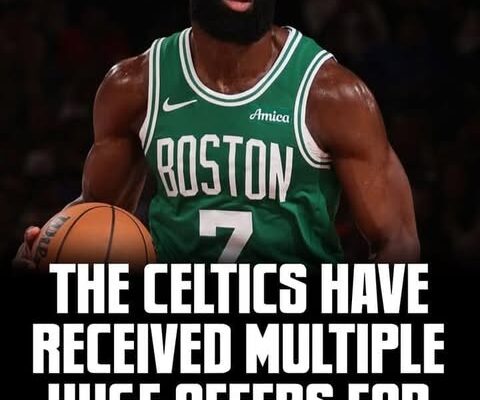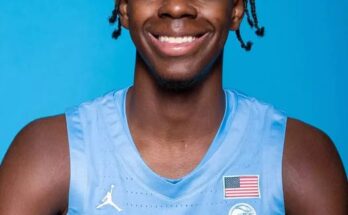The landscape of the Boston Celtics is undergoing a seismic shift, with reports indicating a dynamic and potentially turbulent offseason. At the heart of this unfolding drama are two key figures: Jaylen Brown, who has reportedly received “several high-profile offers” from the Celtics themselves, alongside significant trade interest from rival teams, and Jrue Holiday, who is reportedly “opposed to going” to his new team, the Portland Trail Blazers, following a recent trade from Boston. This juxtaposition of a cornerstone player negotiating his future while another, recently traded, expresses discontent, paints a complex picture for the reigning champions.
Jaylen Brown’s situation is multifaceted. On one hand, reports from June 25, 2025, confirm that he signed a five-year, $304 million supermax extension with the Celtics in July 2023, making it the richest deal in NBA history at the time. This contract was supposed to solidify his long-term commitment to Boston, especially after his stellar performance culminating in the 2024 NBA Finals MVP award and the Celtics’ 18th championship. The “high-profile offers” mentioned in the prompt likely refer to the terms of this supermax deal, which, while massive, may have come with complex clauses or incentives that are now being revisited amidst a dramatic roster reshuffle.
However, the more recent and pressing development, according to insiders like Shams Charania, is that despite this supermax contract, the Celtics are now “listening to offers” for Brown, alongside Derrick White. This doesn’t mean they are actively shopping him, but the phone lines are “ringing in Boston” with “multiple teams” showing “significant interest” in acquiring the four-time All-Star. This willingness to listen, even for a Finals MVP under a historic contract, signifies a new reality for the Celtics.
Several factors could be driving this unexpected turn of events regarding Brown:
- Financial Pressures and the Second Apron: The Celtics have reportedly been aggressive in shedding salary to get under the punitive second tax apron of the NBA’s new collective bargaining agreement. They’ve already traded Jrue Holiday to Portland and Kristaps Porzingis to Atlanta, saving an estimated $180 million in luxury tax penalties. Moving Brown, despite his value, would further reduce their payroll and provide more financial flexibility, avoiding severe future restrictions on roster construction.
- Roster Rebalancing: Even after a championship, teams constantly evaluate their roster composition. While Brown is undeniably a star, the Celtics might be exploring ways to rebalance their talent, perhaps seeking different skill sets, or a more cost-effective supporting cast around Jayson Tatum, who himself just signed a massive extension.
- Perceived Dip in Efficiency/Injury Concerns: Some reports suggest Brown’s efficiency dipped in the season following the Finals MVP award, and he reportedly recovered from offseason knee surgery. While he’s a phenomenal player, any lingering concerns about his long-term health or consistency, especially given his massive contract, could make the Celtics at least consider a blockbuster trade if an “insurmountable package” is offered.
- Jayson Tatum’s Status: Reports also indicate “uncertainty of Jayson Tatum’s status next season” due to an Achilles injury, potentially sidelining him for the entire 2025-26 season. If Tatum is indeed out for an extended period, the Celtics might feel it’s a logical time to retool the roster and potentially embrace a short-term reset rather than trying to contend without their primary superstar while still being financially constrained.
The Celtics’ preference is reportedly to keep both Brown and White, but the willingness to listen to offers, even at a “high price threshold,” indicates that no player outside of Jayson Tatum is entirely off-limits in their quest to navigate the new financial landscape and remain competitive for years to come.
In a parallel and equally disruptive development, Jrue Holiday, a beloved figure and crucial component of the Celtics’ 2024 championship run, is reportedly “pissed” about being traded to the Portland Trail Blazers and “does not want to go there.” This sentiment, reported by Steve Bulpett of Heavy Sports, creates an immediate dilemma for the Blazers and adds another layer of complexity to the Celtics’ offseason.
Holiday, who turned 35 in June 2025, was traded from Boston to Portland in exchange for Anfernee Simons and two future second-round picks. The move was primarily a salary-shedding maneuver for the Celtics, designed to get them under the second apron. Holiday had recently signed a three-year, $104.4 million extension with Boston in 2024.
Several reasons explain Holiday’s reported opposition to joining the Trail Blazers:
- Timeline Mismatch: Portland is firmly in a rebuilding phase, focused on developing young talent like Scoot Henderson. A 35-year-old, two-time NBA champion like Holiday, who is in the latter stages of his career, has clear “win-now” aspirations. Joining a team with no immediate playoff contention goals is a stark contrast to his recent roles with the Milwaukee Bucks (where he won a title in 2021) and the Boston Celtics.
- Desire for Contention: Holiday has consistently expressed a desire to play for a contender. Having just won a championship with the Celtics, being sent to a rebuilding team fundamentally clashes with his career objectives at this stage. He wants to compete for more rings, not mentor young players on a losing team.
- Contractual Implications: While his contract is large, it’s a significant commitment for a team like Portland that is rebuilding. The Blazers, by acquiring him, took on a substantial financial burden for a player who doesn’t fit their long-term timeline. This could make it difficult for Portland to reroute him to a more desirable destination.
- Lack of Control/Communication: Players often value having some input or understanding of potential trade destinations. If Holiday was blindsided by the move to Portland, or if he felt his preferences weren’t considered, it could contribute to his frustration.
Holiday’s reported opposition puts the Portland Trail Blazers in a difficult position:
- Trade Demand Potential: If Holiday’s discontent persists, it could quickly escalate into a trade demand. This would force the Blazers to actively seek another trade partner, potentially at a disadvantage if teams know Holiday doesn’t want to be there.
- Locker Room Dynamics: Even if he remains professional, an unhappy veteran can subtly impact the locker room culture of a young, developing team. His presence could overshadow the growth of emerging stars if the narrative is constantly about his desire to leave.
- Asset Management: The Blazers acquired Holiday to save salary for Boston and perhaps gain some mentorship, but if he’s unhappy, his trade value might diminish, complicating their asset management strategy. Finding a new home for his substantial contract that also yields a return fitting their rebuild timeline would be challenging.
- Impact on Future Trades: Other veteran players considering signing with or being traded to rebuilding teams might take note of Holiday’s situation, potentially making such destinations less appealing in the future.
The Celtics’ offseason, marked by the trades of Holiday and Porzingis, and the ongoing saga around Jaylen Brown, signifies a franchise in flux, even after winning a championship. Brad Stevens and the front office are clearly making tough decisions driven by the new financial realities of the NBA. They are attempting to maintain a championship-caliber roster while also managing their long-term financial health under stricter salary cap rules.
The outcome of the Jaylen Brown situation will dictate the immediate future of the Celtics. If they do trade him, it would be a shocking dismantling of a core that just won a title, but it could also signify a belief that they can acquire assets that better fit their revised vision and financial parameters. Jrue Holiday’s discontent further highlights the often impersonal nature of NBA business, where even beloved champions can find themselves in unwanted situations due to financial and roster considerations. The next few weeks will be crucial in determining the ultimate shape of the Boston Celtics as they navigate these complex waters.



